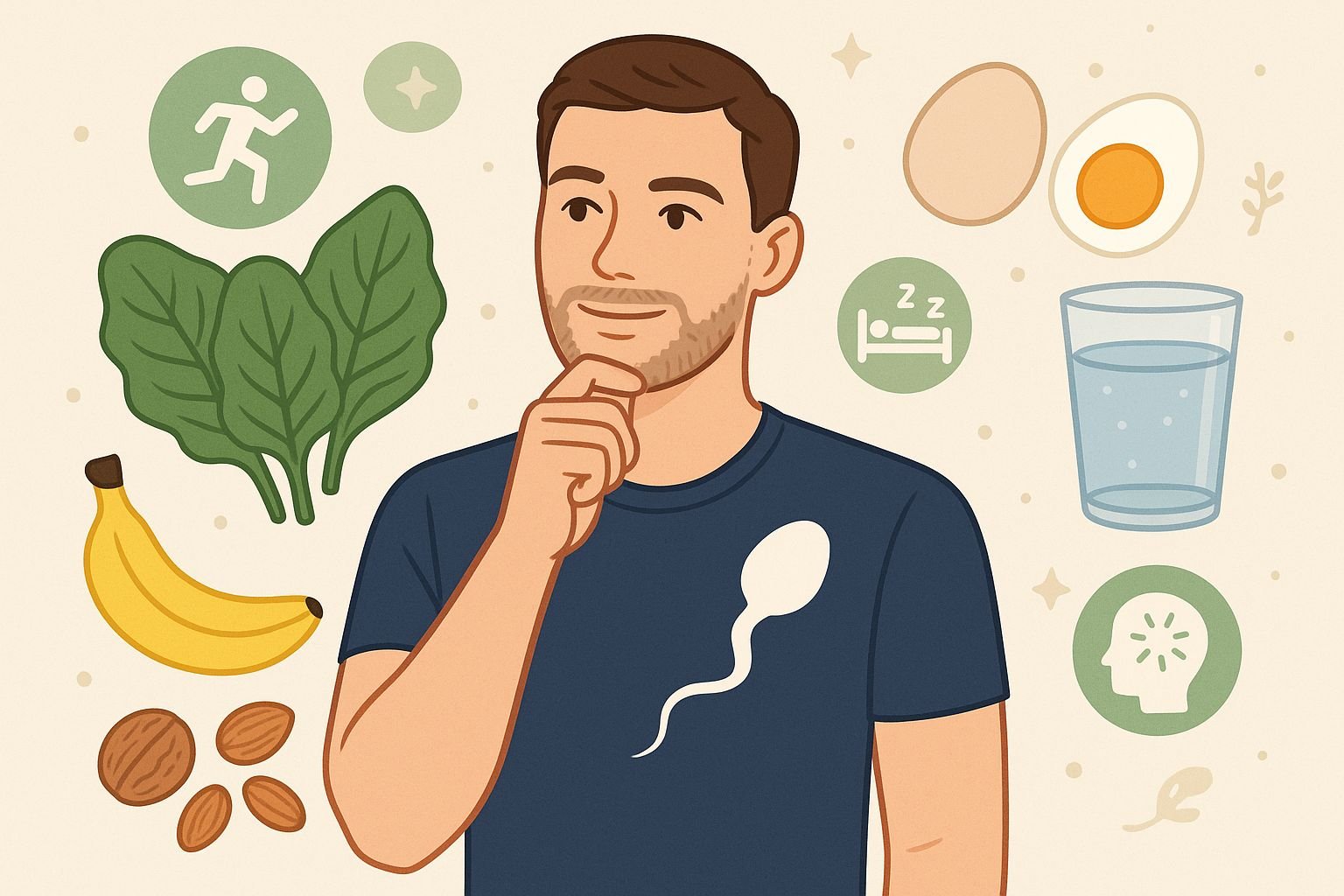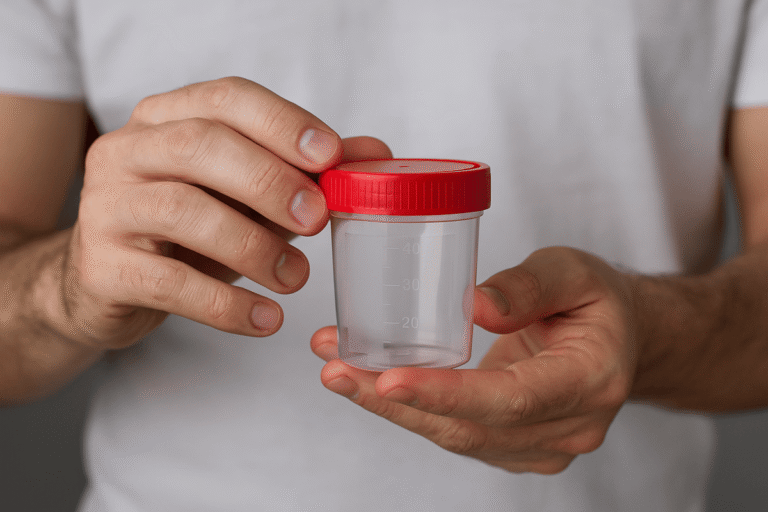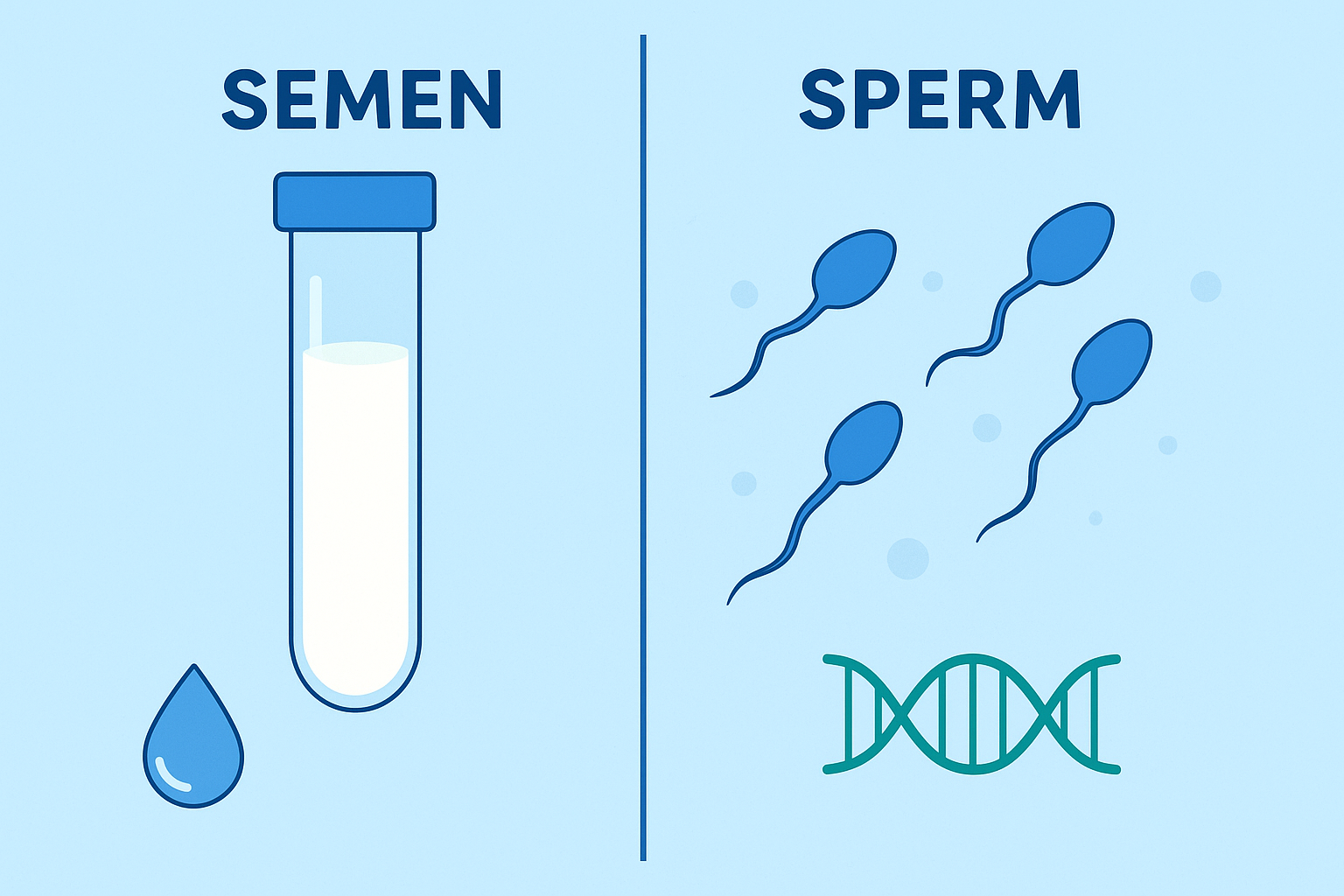Many men are concerned with increasing semen production, whether for fertility purposes or simply to improve their reproductive health. While semen volume can vary from person to person, there are several natural methods that can help men optimize their semen production. Factors like diet, lifestyle, and medical conditions can all influence semen volume. In this article, we will discuss scientifically-backed strategies to help improve semen production and male fertility.
Here are some details and tips on how to produce more semen.
Also read: Can Low-Volume Sperm Lead to Pregnancy?
Understanding Semen Production
Before exploring ways to increase semen volume, it’s essential to understand how semen is produced. Semen is a complex fluid containing sperm cells produced in the testicles and other substances like seminal fluid produced by the prostate and seminal vesicles.
Semen production occurs in cycles, and the body is continuously creating sperm, which typically takes about 2–3 months. However, a variety of factors, including age, genetics, hormonal levels, and lifestyle habits, can influence the quantity and quality of semen. Understanding these factors can help guide you in making informed decisions about improving your semen production.
Diet and Nutrition Tips for Boosting Semen Volume
Your diet plays a crucial role in maintaining healthy sperm production. A well-balanced diet rich in essential nutrients can help enhance semen volume and sperm quality. Here are some dietary tips to boost semen production naturally:
Foods Rich in Antioxidants
Antioxidants protect the body from oxidative stress, which can damage sperm cells. Foods high in antioxidants, like berries, spinach, nuts, and seeds, can help improve sperm motility and volume. Incorporating more antioxidant-rich foods into your diet can be a powerful strategy for enhancing male fertility.
Essential Vitamins and Minerals
Zinc, Vitamin C, and folic acid are particularly important for sperm production. Zinc supports healthy testosterone levels, which are essential for sperm production. Vitamin C helps improve sperm motility and protects sperm from free radical damage. Folic acid, found in leafy greens, lentils, and citrus fruits, also plays a significant role in sperm health.
Hydration
Staying hydrated is essential for overall health and can support healthy sperm production. Drinking enough water helps maintain the fluid balance in the body, including seminal fluid, which is essential for the mobility of sperm.
Foods to Avoid
Just as the right foods can boost semen production, some foods can have a negative impact. Excessive sugar, processed foods, and alcohol consumption can lower sperm quality and volume. Reducing or eliminating these from your diet can help improve semen health.
Lifestyle Changes for Better Semen Production
In addition to diet, several lifestyle changes can help optimize semen production.
The Impact of Stress
Stress can have a significant negative impact on sperm health by affecting hormonal balance and overall reproductive function. When a person experiences chronic stress, the body releases higher levels of cortisol, the primary stress hormone. Elevated cortisol levels can disrupt the production of other vital hormones, including testosterone, which plays a crucial role in sperm production and quality. Stress-induced hormonal imbalances can lead to lower sperm count, reduced sperm motility (the ability of sperm to move effectively), and abnormal sperm morphology (shape and structure). Additionally, prolonged stress can increase oxidative stress in the body, leading to the production of free radicals that damage sperm cells, further impairing sperm health. Stress also negatively affects sleep quality, which is essential for maintaining hormone levels and overall reproductive function. By reducing stress through relaxation techniques, exercise, and proper sleep, men can help restore hormonal balance and improve their sperm health.
The Importance of Sleep
Sleep plays a crucial role in maintaining optimal sperm health. During deep sleep, the body undergoes important restorative processes, including the regulation of hormones like testosterone, which is vital for sperm production. Poor or insufficient sleep can disrupt the balance of reproductive hormones, leading to a decrease in sperm count, motility, and quality. Studies have shown that men who regularly get less than 6 hours of sleep per night may experience lower testosterone levels, which in turn can negatively impact semen quality. Furthermore, inadequate sleep can increase stress levels, which further disrupts hormonal balance. Prioritizing sufficient, quality sleep—around 7 to 9 hours per night—helps support overall reproductive health by ensuring that the body can produce healthy sperm and maintain hormone levels that are conducive to fertility.
Regular Exercise
Exercise can boost sperm health by improving testosterone levels, enhancing blood circulation to the reproductive organs, and reducing stress, which supports hormone balance. Regular physical activity also helps maintain a healthy weight, improves sperm motility, and promotes better sleep, all of which contribute to overall reproductive health. However, it’s important to strike a balance, as excessive exercise can have negative effects on sperm quality.
Avoiding Environmental Toxins
Chemicals and pollutants in the environment can negatively affect sperm production. Avoid exposure to harmful substances like pesticides, heavy metals, and endocrine disruptors. If you work in an environment with chemicals, wear protective gear to limit exposure.
Medical Considerations and Supplements
While natural methods can be effective, there are also supplements and medical treatments that may help increase semen production.
Supplements That Support Semen Production
Certain supplements can support sperm production. L-carnitine, found in red meat and dairy products, has been shown to improve sperm motility. Maca root, an herb traditionally used to boost fertility, may help improve semen volume and sperm count. Ashwagandha, an adaptogen, has been linked to increased testosterone levels, which can improve sperm production.
the following are some supplements that can help boost your sperm health:
- Zinc
- Folic Acid
- Vitamin C
- Vitamin E
- Coenzyme Q10 (CoQ10)
- L-Carnitine
- Maca Root
- Ashwagandha
- Selenium
- Omega-3 Fatty Acids
- Vitamin D
- L-Arginine
- Tribulus Terrestris
When to Consider Medical Advice
If you’re having trouble increasing your semen production or suspect there may be an underlying health issue, it’s important to seek advice from a doctor or fertility specialist. Several medical conditions, such as hormonal imbalances, varicocele (enlarged veins in the testicles), and infections, can interfere with semen production and affect overall fertility. These conditions can lead to lower sperm count, poor sperm motility, and other fertility issues. A healthcare professional can accurately diagnose these problems and recommend appropriate treatments or interventions to improve your reproductive health.
Common Myths About Semen Production
There are many myths surrounding semen production. Let’s address a few of the most common misconceptions.
More Semen is Always Better
While more semen may seem like an indicator of improved fertility, the quality of semen (sperm count, motility, and morphology) is just as important as volume. Focusing solely on increasing volume without addressing sperm quality may not yield significant fertility benefits.
The Effect of Masturbation on Semen Volume
Frequent ejaculation, whether through sexual activity or masturbation, can temporarily decrease semen volume. However, this doesn’t have a long-term effect on fertility. In fact, abstaining from ejaculation for several days can result in higher semen volume, but it may not improve sperm quality.
How Long Does It Take to See Results?
Improving semen production naturally takes time. It’s important to be patient and consistent with lifestyle changes. While dietary adjustments and exercise may show results within a few weeks, significant improvements in semen volume and quality could take a few months.
Conclusion
Increasing semen production naturally involves a combination of healthy dietary habits, lifestyle changes, and possibly supplements. Maintaining a healthy weight, reducing stress, and avoiding toxins are all essential for optimizing sperm health. While results may vary, being proactive about your health is key to improving reproductive health. If lifestyle changes don’t yield the desired results, don’t hesitate to seek professional advice from a healthcare provider or fertility specialist.
FAQs
1. Can supplements really boost semen production?
Yes, certain supplements like L-carnitine, maca root, and ashwagandha can improve sperm motility, volume, and testosterone levels, which can enhance semen production.
2. How long does it take to notice an increase in semen volume?
It may take several weeks to months for lifestyle changes, like diet and exercise, to show visible improvements in semen volume. However, consistency is key.
3. Are there any natural remedies to improve sperm quality?
Yes, antioxidant-rich foods, essential vitamins like zinc and folic acid, and regular exercise can improve sperm quality and motility, which can enhance overall semen health.




